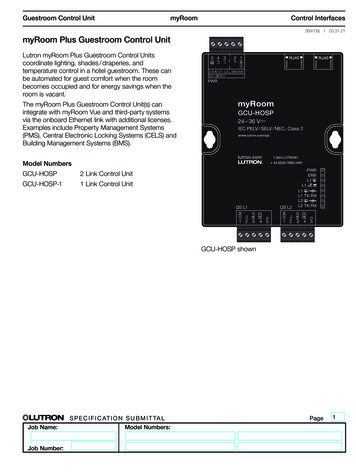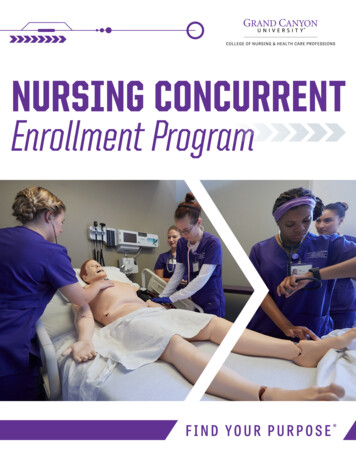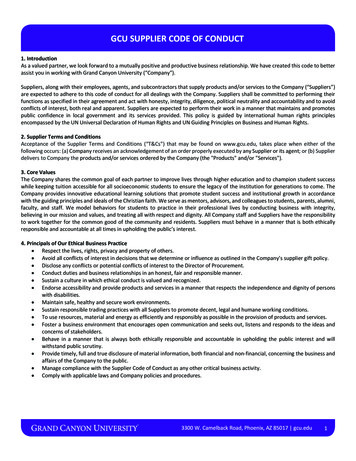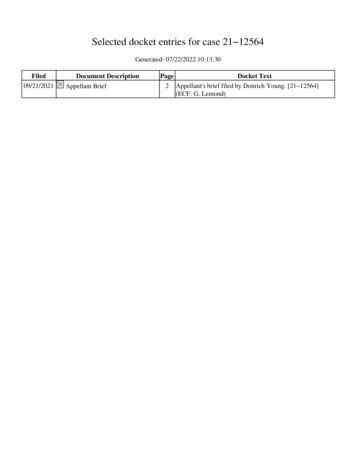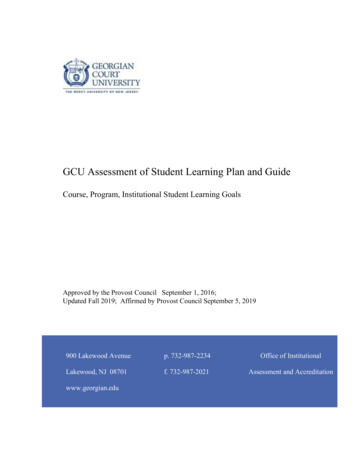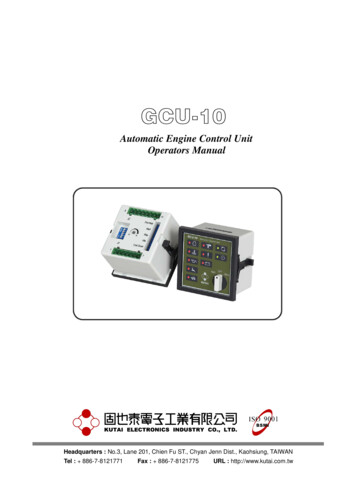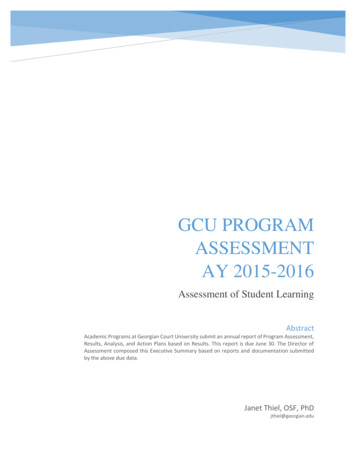
Transcription
GCU PROGRAMASSESSMENTAY 2015-2016Assessment of Student LearningAbstractAcademic Programs at Georgian Court University submit an annual report of Program Assessment,Results, Analysis, and Action Plans based on Results. This report is due June 30. The Director ofAssessment composed this Executive Summary based on reports and documentation submittedby the above due data.Janet Thiel, OSF, PhDjthiel@georgian.edu
Georgian Court UniversityProgram Assessment ReportAY 2015-2016GCU PROGRAM ASSESSMENT REPORTAY 2015-2016Executive SummaryPrepared by Janet Thiel, OSF, PhD, Director of AssessmentDr. Michael Gross, Associate Provost, requested all academic programs to submit a ProgramAssessment Report by June 30, 2016, and upload such to the university drives. A templateprovided the outline for these reports. Department and Program identifiers, Goals Assessed, Department Meeting Discussions based on Assessment Results, Recommendations for Improvement, Implementation, Follow Up on Previous Recommendations.The majority of programs submitted the reports as requested. These reports were reviewed byJanet Thiel, OSF, PhD, newly appointed Director of Assessment. A summary of reports follows,delineated by school and program.School of Business and Digital MediaProgram(s): B.S. in Accounting and Business Administration and for MBA.Report submitted by: Janice Warner with input from Ashley Elmore, Cathleen McQuillen,Joseph Monahan, Bertram Okpokwasili, and Neal SteedSummary: Report followed the template and ACSBP guidelines. The program lists sevenprogram goals. Assessment data included course assessment and an analysis of Major Field Test(MFT) results. Course assessment results as well as the analysis of the MFT determined theprogram’s implementation of result analysis and action steps. The following table outlines theresults and plans for improvement. In the AY 2014-15 assessment report, sevenrecommendations were made for AY 2015-16. Most notable was the decision to complete morein depth analysis of the results of the MFT to get more specific information about the topics withwhich the students struggle. The department did a review of this data on Assessment Day todetermine if the topics needed to be covered or covered in more depth. Other recommendationswere completed or included in the recommendations for AY 2016-17.Table 1. School of Business Program Assessment Results and Action Plans AY 2015-2016Prepared by: J. Thiel1Date: 8/25/2016
Georgian Court UniversityProgram Goal1. Demonstrateeffective oral andwritten businesscommunicationskillsProgram Assessment ReportAssessmentResultsGoal 1 Writingneeds attentionbased ondifficulties somefaculty uncoveredin their courseassessments.AY 2015-2016Recommendation Timeframe1A – Add at leasttwo writingintensive coursesin 2016-2017 andassess need formoreSpring 20171B – Make use of Fall 2016Writing Center forbothundergraduate andgraduate courses.2. Understand the Goal 2 is mostly2A – Evaluatecurrent businessmeasured through Peregrine Testenvironmentthe MFT test. Anew test fromPeregrine will bereviewed becauseit seems to bebetter alignedwith ACBSPstandards.2B – Incorporaterecommendationsbased on MFTanalysis (seefollow-up of2015-16 goal A1)Prepared by: J. Thiel2ResponsiblePartyJ. Warner willproposeBU491 andencourageother facultyto becomewritingintensivecertified andsubmit courseproposals.Invite writingcenter directorto departmentmeeting.Summer2016J. Warner willget access todemo andinvite facultyto review.2016 – 2017Accounting –N. SteedMarketing(undergradand grad) – A.Elmore, A.MunghaleMBAManagement– A. ElmoreDate: 8/25/2016
Georgian Court UniversityProgram Goal3.Collaborateand workeffectively onteamsProgram Assessment ReportAssessmentResultsGoal 3 continuesto be difficult toassess. A rubricbased on theAAC&UVALUE rubricon teamwork wascreated and waspiloted in BU491and in associationwith ent ofBU321.AY 2015-2016Recommendation TimeframeResponsiblePartyFaculty3A – Continue toincorporate COILcomponents inclasses in order togive studentsmore experienceworking in globalvirtual teams.2016 – 20173B – Discussways of helpingstudents to workmore effectivelyon team projects3C - Distributesurvey instrumenton teamworkFall 2016SchoolMeetingFall 2016J. Warner4. Assessinformationcritically.Prepared by: J. Thiel3Date: 8/25/2016
Georgian Court UniversityProgram GoalProgram Assessment ReportAssessmentResults5. DemonstrateFor Goal 5,ethical businessdemonstratingbehaviorethical businessbehavior,teaching ethicsacross thecurriculum seemsto be workingand allows forrelevantexamples to beintegrated withthe relatedsubject matter.6. Articulate their Goal 6 is mostlycareer goalscovered byBU450 InternshipPrep and BU451Internshipalthough otherfaculty membersdo spend sometime connectingcourse work tocareers.7. Competently usedata and technologyas a tool for makingdecisionsPrepared by: J. ThielAY 2015-2016Recommendation Timeframe5A – Discuss plan 2016 – 2017for specificattributes to assessacross thecurriculum withprogramcoordinators6A – Makestudents moreaware of CareerServices resourcesfor internshiplocation42016 – 2017ResponsiblePartyProgramCoordinatorMeetings –Steed,Elmore,Monahan,OkpokwasiliStantonDate: 8/25/2016
Georgian Court UniversityProgram GoalOtherProgram Assessment ReportAssessmentResultsThe pilot of usingBlackboard’sgoal alignment toassignments wassuccessful andwill makedetermination ofgoal coverageand performanceagainst goalseasier. A reviewof the outcomeswill be given tofaculty and theywill beencouraged touse the capabilityto support theircourseassessments.AY 2015-2016Recommendation Timeframe8A – Use goalalignment toolacross all courses2016 – 2017ResponsiblePartyAll Faculty8B – Finishinvestigation ofBlackboardportfoliocapabilities forassessment2016 – 2017J. WarnerDepartment: Communication, Graphic Design & Multimedia.Name(s) of Faculty compiling report: Dr. Edmond SalsaliSummary: Report was based on Fall 2015 results. Program goals were aligned with specificcourses, and course assessment was used for program assessment. Course grades were used asindirect evidence of achievement. See Table 2 below for assessment results and action plansbased on these results.Prepared by: J. Thiel5Date: 8/25/2016
Georgian Court UniversityProgram Assessment ReportAY 2015-2016Table 2. Communication, Graphic Design and Multimedia Assessment Results and Plan AY 2015-2016Program GoalAssessment completedAssessmentResultsAction Plan1. Demonstrate aglobal view ofdesign theory andhistoryGD113: Creation of acorporate identity,requiring preliminaryresearch on the designhistory and other designrequirements for thespecific corporationGD113: 70% ofstudentsreceived a gradeof B or above,while 30%received gradesof B- or belowGD113: The outcome forthis project was satisfactoryand no further action isnecessaryGD422: Creation of afunctional website for aprofessional entity basedon thorough research onthe design history of theorganization. Theoutcome of the initialresearch should bedescribed in a writtenstatementGD422: 60% ofstudentsreceived a gradeof B or above,while 40%received gradesof B- or belowPrepared by: J. Thiel6GD422: The majority ofstudents’ projects weresuccessful and the technicaland aesthetic outcomeswere satisfactory. A gradeneeds to be assigned to thewritten statement, so thatstudents pay more attentionto the initial research ondesign requirements of theprojectDate: 8/25/2016
Georgian Court UniversityProgram Assessment ReportAY 2015-2016Program GoalAssessment completedAssessmentResultsAction Plan2.Demonstrate apersonal stylethrough theapplication oftheory andpracticeGD226: Creation of amusic video, includingvideo capture andediting, as well assynchronization of musicand video, whileexpressing one’spersonal style andindividual approach tothe final realizationGD226: 80% ofstudentsreceived a gradeof B or above,while 20%received gradesof B- or belowGD226: Although themajority of studentsproduced outstandingfinished video projects forthis assignment, reflectingtechnical dexterity andstrong personal styles, Itwas noticeable that thelevel of efforts amongstudents wasn’t consistentthroughout the entire life ofthe projects. For example,some students workedharder when getting closerto the due date of theproject. To avoid this tohappen again, it isadvisable to assign smallergrades at different levels ofthe project’s lifespan.GD422: Creating afunctional game inHTML based onpreliminary research onthe chosen subject andwriting a game script.The game has to reflect astrong personal styleGD422: 70% ofstudentsreceived a gradeof B or above,while 30%received gradesof B- or belowPrepared by: J. Thiel7GD422: While themajority of students createdtechnically strong projects,the intellectual levels ofmost of the subjectsweren’t satisfactory. It isadvisable to predefine anumber of subjects thatstudents could select fromrather that leaving thechoice of the subjects ofthe games to the students.Date: 8/25/2016
Georgian Court UniversityProgram Assessment ReportAY 2015-2016Program GoalAssessment completedAssessmentResultsAction Plan3. Be fluent andflexible indesigning forprint andelectronic mediaGD113: Creating aposter meant to promotea commercial product.This project is aimed forprintGD113: 65% ofstudentsreceived a gradeof B or above,while 35%received gradesof B- or belowGD113: The outcome forthis project was satisfactoryand no further action isnecessaryGD226: 75% ofstudentsreceived a gradeof B or above,while 25%received gradesof B- or belowGD226: The outcome forthis project was verysatisfactory and no furtheraction is necessaryGD226: Creation of avideo reel with the goalof promoting acommercial product.This project is aimed foronscreen viewingPrepared by: J. Thiel8Date: 8/25/2016
Georgian Court UniversityProgram Assessment ReportAY 2015-2016School of EducationUndergraduate Teacher Education.Report submitted by: Lynn DeCapuaFormat: Submission of CAEP, 2016 EPP Annual Report.Summary: The CAEP report summarized student achievement and assessment results asrequired by the submitted form. Student achievement was assessed with multiple measures andevidence captured in a submitted portfolio and in class assignments. Additionally, studentscompleted a self-assessment and supervisor evaluations of student teaching completed the directassessment results presented. There were no recommendations for future action reported. Sampledata is from this report are given below.2.1.1 Number of completers in programs leading to initial teacher certification orlicensure: 1082.1.2 Number of completers in advanced programs or programs leading to a degree,endorsement, or some other credential that prepares the holder to serve in P-12schools (Do not include those completers counted above.): 75Total number of program completers 183Number of Individuals Taking and Passing Teacher Credentialing Exams: Georgian CourtUniversity Traditional, Academic Year 2013-2014: 109 Takers, 109 Passers Academic Year 2011-12 Program Pass Rates 97%Academic Year 2012-13 Program Pass Rates 94%Academic Year 2013-14 Program Pass Rates 100%Table 3. Undergraduate Education Taskstream Rubric Scores for 2014-2015 Completers.Prepared by: J. Thiel9Date: 8/25/2016
Georgian Court UniversityProgram Assessment ReportAY 2015-2016Evaluation grid for "BA Education REV"Undergraduate K-6ED 3100Course /SignatureAssignmentMeanStd Dev.NED 3105TechnologyWritten ReportLearning Env.Portfolioand Lesson Plan and Class. ilosophy andCommitment3.210.6616ED 3115ED 3201DifferentiatedSS Unit PlanInstruction Plan3.693.880.870.754850ED 3205ED 3206ED 3220ED4213CoPlanningLesson WithReflection3.750.59506 GraphicInformal Reading Mathematics andOrganizersInventoryScience Unit Plan3.894.153.590.830.670.89494649ED 4301ProfessionalPortfolio4.260.6351Evaluation grid for "BA: Pre-Service Inclusive ECE"EE 3301Pedagogy,Neoliberalism, &ECE ProfMean2.75Std Dev.N1Course /SignatureAssignmentEE 3302HumanDevelopmentTheoriesLesson PlanReport3.05EE 3303GuidedObservationReport2.9111TechnologyWritten ReportLearning Env.Portfolioand Lesson Plan and Class. Mang3.263.603.600.420.670.631599ED 3110PersonalPhilosophy andCommitment3.091.157EE 3304EE 3305Obs. & Theor.Less Port - MathAnal. Early LitSci. & Tech inBronfenbrenner’sPracECEEcological Theory2.573.572.800.26212ED 4213Co PlanningLesson WithReflectionEvaluation grid for "BA Education REV"Secondary Education - K-12ED 3100Course /SignatureAssignmentMeanStd Dev.CountED 3105ED 3120ED 3201Unit-ContentDifferentiatedDiscipl.Instruction Plan3.964.210.490.541415ED 3210ED 3215ED 4211Lesson Plan6 GraphicBased Textbook Informal .790.41141514ED 4213ED 4301Co PlanningLesson 91515Graduate Programs in Education.Masters in Education. Teacher Education.See report above for Undergraduate Education.Table 4. TE Graduate Students Taskstream Rubric Scores for 2014-2015 Completers.Evaluation grid for "NJ Certificate: Teacher Rev"Evaluation grid for "MA Education:El. Ed. Dual Cert w/ DisabilitiesREV"EDC 5105 GuidedWritten Reportand Lesson PlanMean3.60Std Dev.0.60N30Course/ SignatureAssignmentObservationReport3.610.6130EDC 5110PersonalPhilosophy3.200.4329EDC 5115SS Unit Plan3.110.2929EDC 5158EDC 5206EDC ioInstruction Plan3.154.440.240.5030296 329EDCMath5225andScience UnitPlan3.430.9129EDC 5158EDC 5215EDC 5220InformalReadingInventory4.070.5412EDC 5230EDC 6080Lesson PlanBased EDC 6080EDC 6313ProfessionalCo Planning CoPortfolioTeaching4.224.300.680.503030Evaluation grid for "MA: Education-Subject Specific with Sp.Ed. End.REV"Graduate - K-12EDC 5105Course/ SignatureAssignmentMeanStd Dev.N Written Reportand Lesson Plan4.090.5512GuidedObservationReport3.670.7812EDC 5110EDC 5120PersonalContentPhilosophyDiscipline Unit3.503.860.380.371212EDC 5206TechnologyDifferentiatedPortfolioInstruction Plan3.064.240.420.6312126 GraphicOrganizers3.720.6312EDC 6313Co PlanningLesson WithReflection3.900.4712Academic Leadership.Report submitted by Dr. Amu MagayaAcademic Year: 2014-2015. Report missing for AY 2015-2016.Report: Submission of CAEP 2016 EPP Annual Report for Academic LeadershipProgram.Table 5. ALP Taskstream Rubric Scores 2014-2015 Completers N 20.Prepared by: J. Thiel10Date: 8/25/2016
Georgian Court UniversityProgram Assessment ReportAY 2015-2016Program: ALP Taskstream Scores 2014-2015 Completers.12/6/2015Highest possible score: 5Course/SignatureAssignmentEDC 5010CurriculumPlanAverageStarndardDeviationEDC 5014ResearchProposalEDC 5101EDC 5102School LawTeachingPresentation ObservationEDC 6101PersonalLeadershipPhilosophyCase StudyEDC 6102StrategicAction PlanEDC 6103AnnualReportEDC 6104DistrictBudget PlanEDC 6401SupervisionAction Plan .760.520.610.420.670.680.440.920.620.63Autism Certificate Program.Report submitted by Lisa Dille.Academic Year: 2014-2015. Report (2013-14 Completers). Report updated annually inApril on previous year’s completers. See Keystone Assignment data below.Educational Services and Advanced Studies.Report submitted by Lisa Dille.Academic Year: 2014-2015. Report (2013-14 Completers). Report updated annually inApril on previous year’s completers. See Keystone Assignment data below.Master of Arts in Instructional Technology.No report. No students in program. Program start date is Spring 2017. Assessment Plansubmitted.Summary: Each of the graduate courses in this degree program includes a keystoneassignment (available on Taskstream) aligned with program and course goals which is scoredusing a rubric (also available on Taskstream). Scores on these keystone assignments indicateperformance and achievement of course objectives and program goals.Instructional Technology Certificate.See report above for Master of Arts in Instructional Technology.Department: School CounselorReport submitted by Michael J. Tirpak, Ph.D.Semester and year: May 2016Summary: Relevant program goals assessed by the Keystone projects are represented onTaskstream under the Georgian Court University School Counselor Program and they arealso indicated in course outlines. Every course in the program has a Keystone projectrepresentative of relevant course goal(s) and the scoring is available in the individualcourse assessments relevant to the program. Keystone assignments reflect only a portionof the course experience for the student, yet are critical to assessing the growth andsuccess of students. Program faculty have observed that students appreciate detaileddiscussion and support of Taskstream projects. No change is anticipated. See KeystoneAssignment data below.Table 6. EDU Keystone Assignment Data for Post-Baccalaureate Programs Excluding Teacher EdPrepared by: J. ThielEDC6090/6091InternshipProject11Date: 8/25/2016
Georgian Court University3.780.8320MeanStd Dev.NAY 2015-2016GCU Education Programs - Post Baccalaureate (Exculuding Teacher Ed)Keystone Assignments Evaluated by RubricAY 2014-2016 CombinedPhilosophyStatementProgram Assessment ReportEDC5001MissionPosition EDC5014DiversityPowerPoint Curriculum Action ResearchTrainingPresentation 60.960.660.911451927AY 2014-2016EDC 5020ResearchPaperMeanStd Dev.NMeanStd Dev.N2.7113.370.2813EDC5301LiteratureReviewMeanStd Dev.NMeanStd Dev.N3.001EDC 5022ESL icCurriculum GuideOrganizer - Organizer USEDO eportMeanStd Dev.NEDC .3616EDC5302LiteratureReview3.000.007EDC 70.3836EDC 5201Analysis - LiteraryReflectiveInstruct. (USE) Journal (DO NOTUSE)4.930.1023.000.006EDC 6201EDC6301EDC6302LiteracyLiteracySummary Report Written ReportStudiesStudies(USE THIS(STOP-DoONE)Not tEducationalAdministrati Evaluationon Report3.053.68Mean0.100.46Std Dev.45NPrepared by: J. ThielEDC7003Paper and OralPresentation3.880.225EDC 5026LanguageAnalysisSample2.711EDC5033Case Study3.001EDC5034RTI Report4.500.6364.370.4329EDC 5202Eval.EvaluateClassroomClassroom Library (DOLibrary (USE) NOT USE5.004.953.830.07121EDC5303EDC5304Literature Review MultidisciplinaryAssessment Plan3.000.007EDC tenSummary3.000.004EDC 6304CareerCounselingPlan4.310.2612EDC 037EDC5038CriticalCaseTest EDC 5203EDC 5204StrategiesStrategies Master ReadingMasterNotebook (USE) NotebookPlan (USE)Reading Plan(DO NOT(DO NOTUSE)USE)4.900.1423.001EDC6093Summary se .2413EDC7801150-hourPracticum4.100.22512Date: 8/25/2016
Georgian Court UniversityProgram Assessment ReportAY 2015-2016School of Arts and SciencesUndergraduate Programs.Art & Visual Studies, MusicReport submitted by Leo MorrisseySemester and year: Spring 2016Summary: Assessment of introductory Art and Music courses will occur as part of thenew general education assessment. The Art majors will create and maintain portfolios that wouldbe used to assess the student’s progress in AR 499 Senior Exhibition Seminar, which is thecapstone course. These assessment plans and portfolio guidelines and rubrics will be developedin AY 2016-2017. No data given for the current year.BiologyReport submitted July 14, 2016 by Louise Wooton.AY 2015-2016.Summary: Report listed Biology Program Goals and Objectives, and aligned courseassessment with these. The following courses were used to gather program assessment data: BI120, BI121, BI203, BI204, BI305, BI444. Both direct and indirect assessment data was listed,from both formative and summative courses. The outcomes from the course assessments werediscussed and an improvement plan given. Lab reports, classroom assignments, course projects,and major exams provided evidence of student learning. Adjustments to course topics,assignments, and additional clarification and instruction related to these assignments were amongthe improvement plans cited. Results of performance from the Major Field Test in Biology wereincluded, but these were not normed with national results. The assessment results also cited adepartment specific student survey on values to determine variance and growth between firstyear and senior-level students (Pre and post survey in BI120 and BI444), used to assess Goal VI.The improvement plans included the following actions:Student Learning GoalCourses used for assessmentI. Demonstrate knowledge of the major facts and concepts ofbiology.BI 120, BI121, BI204,BI305, BI444II. Use biology laboratory field methods, tools, andtechniques.BI 120, BI121, BI204,BI305,III. Demonstrate the ability to use the scientific method.BI203, BI204IV. Display the ability to read effectively and criticallyevaluate scientific literature.BI 120, BI204, BI444Prepared by: J. Thiel13Date: 8/25/2016
Georgian Court UniversityProgram Assessment ReportAY 2015-2016V. Communicate biological information effectivelyBI121, BI204, BI305,BI444VI. Develop a values system affected by study of biology.BI 120, BI444Goal 1.BI120: I will also continue to assign weekly Power Point assignments that allowedstudents to assemble label and reflect on the material learned that week. I believe more time forreflection after finishing the observation of a kingdom is necessary for these topics to solidify inthe mind of students.Goal 2.BI120 (lab): Students were assessed in groups of four/five and not individually for fall2015. In Spring 2016, they were asked to demonstrate individual proficiency and given acheck /- for the task rather than a grade so that they wouldn’t get performance anxiety. Continuecurrent practices but test explicitly on labeling in the final next time.Goal 1.BI305: I like the idea of the term project but if this is used again a number ofimprovements are needed including more emphasis on academic journaling skills (what sourceswere read, what key ideas learned, keeping track of citations).Presentations were not at all useful.Maybe in the future some kind class discussion could be used to brainstorm and share ideas andhelp students focus on desired learning outcomes. Ideally students would turn in a draft of theterm paper for feedback before submitting their final paper for evaluation. Perhaps the papercould be written in subsections with feedback being provided for the earlier portions of the paperat least.Goal 2.BI305 (lab): It may be helpful in the future to have students complete fewer experimentsover the semester, and take more time to explicitly teach skills such as data collection,organization and simple analysis (data interpretation).Goal 3.BI204: Experimental set-up and data analysis was a clear area of weakness. In the Springsections, most of a lab period was dedicated to developing an experimental design including aplan for gathering and analyzing quantitative data. However, only 2 of 7 groups carried throughon their plan fully. For Fall 2016, I would like to set aside time for the whole class to share theirexperimental designs and strategies with each other, in the hopes that teaching each other will aidtheir comprehension (I think the risk I’ll be running is a significant loss in originality if they startcopying each other’s designs). I will also be swapping out an early lab, changing a case study toa hands-on lab that will include a student’s t-test and graphing in excel.Goal 4.BI444: It seems clear that, without a background in statistics, BA students really don’thave the skill set needed to do the upper level thinking required in this course. The departmentneeds to consider creating separate capstone experiences for the BA versus the BS to prevent thefrustration and sense of being overwhelmed that clearly pervaded the BA students in this classthis semester. In addition, this course is a lot of work for 1 credit, which I think is why at the endPrepared by: J. Thiel14Date: 8/25/2016
Georgian Court UniversityProgram Assessment ReportAY 2015-2016the students do time management and assign less time to the work in this class than to the moreGPA – impactful classes. In the future, the department should consider moving this course to 2or 3 credits to give students appropriate credit (and consequences) for the amount of workexpected.Goal 5.BI305: If the term project is done again next year I think that I need to find a differentway for students to share their findings that better meets the pedagogical goals of the class whilestill providing students with the opportunity to hone their oral presentation skillsGoal 6.BI 120 & BI444: Care should be taken in interpreting the data from this survey as thecomparison is not a cohort one: It is of two different groups at the start and end of the degree. Itis also a small sample (n 20 in each case). Based on these findings, the department needs todiscuss ways to increase students’ understanding of evolution, as this seems to be a seriousdeficit in this year’s seniors (backed up by generally very poor scores on the MFAT in this areathis year).Table 7. Biology MFT Results Spring 2016Chemistry & Biochemistry, Natural SciencesReport submitted by Dr. Eduard BittoAY 2015-2016.Summary: Data from course assessment was aligned with the program goals of criticalthinking. Analysis showed that students in the 200 level course did not meet expectations, butthat there were few Chemistry majors in the sampling. Assessment of critical thinking skills in a400 level course met expectations.Prepared by: J. Thiel15Date: 8/25/2016
Georgian Court UniversityProgram Assessment ReportAY 2015-2016Quantitative analysis of results from Major Field Achievement Test (MFAT) in chemistry ispresented below to address the goal of foundational knowledge. Due to a small size of theprogram, which typically graduates 3–5 students per year on average, the program presentedanalysis of the data collected in the last 5 academic years. In addition, biochemistry and criticalthinking sub-skills scores were evaluated.To improve laboratory skills of GCU students, over the last three fall academic semesters (Fall2013; Fall 2014; Fall 2015), the department has used, and will continue to use, in-houselaboratory exercises for the 100-level general chemistry course sequence with a focus onimproving student understanding of equipment use, precision and accuracy related to theexperimental nature of the discipline, and conceptual understanding of the foundations of thefield. In addition, an improvement in student critical thinking skills is developed through analysisof collected experimental data and application of skills acquired in the laboratory to alternatereactions or chemical systems. Data collected was presented in table format, highlightingdifferences between pre- and post- interventions. Based on the data, the course instructorconcluded:“Student performance has improved over the last three fall term. AY 2015 and 2014, as a whole,have seen an increase in earned average grade across the sections.”Students’ communication skills were extensively evaluated in 200-level organic chemistry Iclasses in the last several years, and including Fall 2015. The course is taken by mostly biologymajors with an occasional bio/chemistry major and health science majors. Students’ writingskills were assessed and honed in Fall 2015 in the 300-level biochemistry I class. (Class typicallyhas about one 30% biochemistry, 70% biology majors.) Communication skills of chemistry andbiochemistry graduates were evaluated in the senior level chemistry seminar course. Data fromthese assessments were included in the report. Senior level students in 2016 achieved score of73% on presentations and 66% on papers.The department analyzed and discussed the results of assessment of critical thinking skills,foundational knowledge, laboratory skills, and communication were analyzed and discussed bythe department. Resulting action plans include the following. In foundational courses, faculty will emphasize homework completion and use of theflipped classroom and benchmark learning to improve foundational knowledge andcritical thinking. Pre-lab online quizzes will precede laboratory course days. The department faculty members will review and implement in an appropriated form aplan proposed to improve senior seminar experience: Plans envisions, thato faculty members will develop specific questions/projects/topics to be investigatedin inorganic chemistry, organic chemistry, analytical chemistry, computationalchemistry and biochemistry.o Students will be asked to choose to work on any one project, under the guidanceof the faculty who developed the project.o Students would investigate in depth the question(s) posed by searching relevantauthoritative scientific literature.o Finally, students would “defend” their answer/solution to the question in apresentation to the department faculty/students and write a “thesis” on their work.Prepared by: J. Thiel16Date: 8/25/2016
Georgian Court UniversityProgram Assessment ReportAY 2015-2016Table 8. GCU Chemistry and Biochemistry MFAT scores: 5 year averageTable 9. MFT class sub-scores for Biochemistry and Critical ThinkingYear(s)2012–20152016Biochemistry42% (22th)(N 19)43% (25th)(N 8)Critical Thinking34% (14th)(N 19)37% (22nd)(N 8)Criminal Justice, Anthropology, and SociologyReport submitted by Anna King.Fall 2015.Summary: Program is undergoing significant revision. Process began with a review
Prepared by: J. Thiel 1 Date: 8/25/2016 GCU PROGRAM ASSESSMENT REPORT AY 2015-2016 Executive Summary Prepared by Janet Thiel, OSF, PhD, Director of Assessment Dr. Michael Gross, Associate Provost, requested all academic programs to submit a Program Assessment Report by June 30, 2016, and upload such to the university drives. A template
